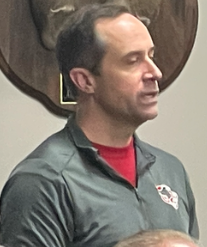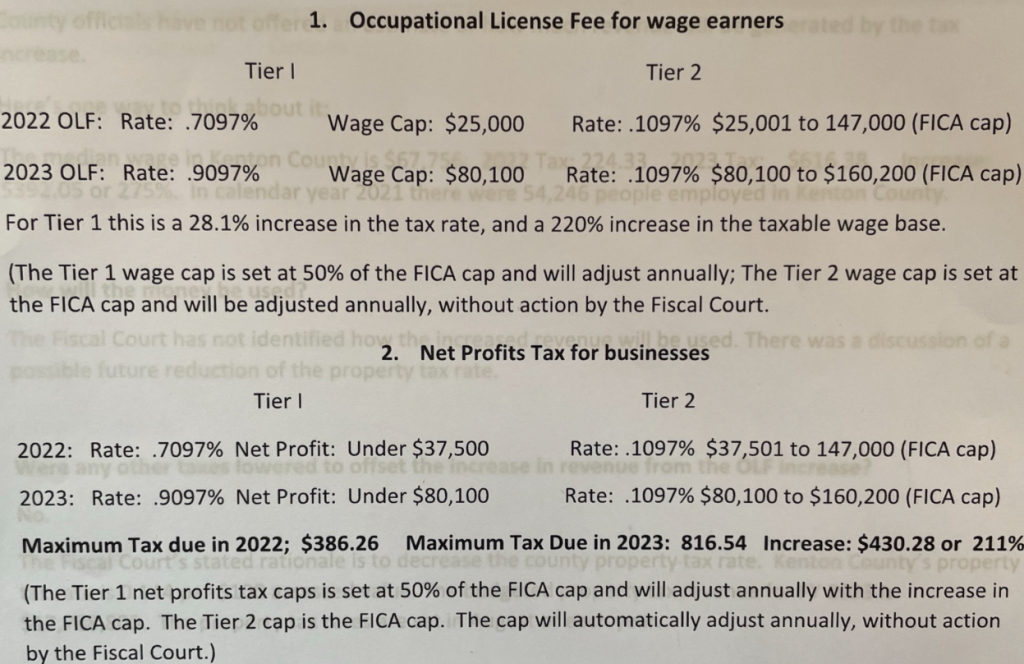By Patricia A. Scheyer
NKyTribune reporter
The monthly Saturday morning meeting of the Kenton County mayors held at Ft Mitchell city building spilled out into the hallway.
The main topic of conversation was the contentious issue of the Kenton County Fiscal court raising the payroll tax rate from .7097 to .9097, along with the net profit tax, and increasing the cap on the payroll tax to 50 percent of the Social Security max.

County Judge-Executive Kris Knockelmann and Mayor of the county’s largest city Joe Meyer of Covington have decidedly different points of view on the county’s tax increase. (Photo by Patricia Scheyer/NKyTribune)
Covington Mayor Joe Meyer took the lead on the conversation.
“We’re not talking about a small increase in revenue,” Meyer stated after explaining about the raise in taxes. “There’s a very significant raise in revenue.”
He said understanding the need for this change is something that, collectively, is a problem. The county has not explained what the money will go for, he said, or indicated exactly how much revenue this tax increase will generate.
Meyer also said that this tax, and the stacking of the county tax on top of the city tax, represents a major change in public policy.
He said for years the law in Kentucky has been that in cities over 30,000 in population, the city tax is a one hundred percent credit against the county tax and the reason is to avoid duplicate taxation.

Sen. Chris McDaniel urges both sides to cooperate (Photo by Patricia Scheyer/NKyTribune)
“If we had that city tax credit, we wouldn’t be concerned,” he commented, “and our problems would all just go away.”
Apparently back in the late ’70’s and ’80’s a part of the law demanded a referendum by the public if the tax was changed in any way. But in 2021 the law was changed, eliminating the public referendum and specifically prohibiting the city credit.
Handouts were provided by the county and by Meyer to clarify certain points.
One of the handouts attempted to answer some of the questions.
It stated that Kenton County estimates generating $9,621,889 in additional payroll revenue, and $1,039,332.28 in additional net profits for a total of $10,661,221. This will apparently allow Kenton County to stabilize the operational deficit caused by the restrictions on payroll and property taxes. The county identified the deficit as being $4,613,452 this year alone, and when added to the carryover of $3,061,291 from last year, the total deficit is $7,674,743.

Kenton commissioner Joe Nienaber defend the tax hike. (Photo by Patricia Scheyer/NKyTribune)
Due to the lack of being able to increase the amount of money coming in, the handout specified, Kenton County finances would be ‘unsustainable due to budgetary increases driven by jail, healthcare, and pension costs.’
County Treasurer Roy Cox was able to extend the projected date of the county becoming economically distressed, or running out of money, to the 2026-2027 budget since they received an influx of federal funds.
But something had to be done, he said, and action obviously had to be taken sooner than later. This explains why the county had to switch the revenue source from property tax to payroll tax, and adjust the cap from a stationary $25,000 to 50 percent of the Social Security max, which increases the cap dramatically now, and increases every year. Revenues have to at least equal expenditures or the county could go bankrupt.
Kenton County Judge Executive Kris Knochelmann admitted that he had to take action when he did.
“Sometimes you have to be the adult in the room and take ownership,” he stated. “If anyone disagrees with the need, then let’s start there. The solution is a whole different conversation. And again, this is not set in stone for a billion years, it’s a policy, it’s a tax rate, for crying out loud. You can adjust it. It’s 2 percent.”
Independence Mayor Chris Reinersman objected to that number,

Taylor Mill Mayor Daniel Bell said he hopes he can still attract businesses to his city. (Photo by Patricia Scheyer/NKyTribune)
“Your nominal two tenths of a percent raised the payroll tax in my city to over 16 percent, where I am working on it, using every tool in my toolbox to attract businesses,” said Reinersman. “I feel a little blindsided by it. I feel like I should have been at the table. At least made aware of it, so I can have a better understanding of it.”
“We shouldn’t have to make a phone call for every little change,” said Knochelmann.
“You’re the county–whatever you do affects all of us,” countered Reinersman, indicating the mayors of the cities within the county.
Ft Wright Mayor Dave Hatter agreed.
“My point is, If we change something in Ft Wright, they can go to Ft Mitchell, but if you change something in Kenton County, where are they going to go?” Hatter said. “Campbell County? Boone County? Hamilton County? It is a difference.”
Reinersman agreed that possibly small changes don’t have to be shared or noted, but he stated this was a triple digit percent increase in payroll tax, and in the cap.
“This is substantial,” he said. “If this has been going on for 16 years, why is the first we hear of it when it is passed?”

Independence Mayor Chris Reinersman was vocal in his dislike of the payroll tax increase. (Photo by Trisha Scheyer/NKyTribune)
“What I’m hearing here is ‘you didn’t ask permission’,” said Kenton County Commissioner Joe Nienaber. “The only permission I really care about is the same people you care about. That’s why you’re fighting this so vigorously. It’s about the citizens of Kenton County. We discerned what we thought was best for the Kenton County citizens. If that’s contrary to what anybody’s belief, I’m sorry. It wasn’t intended.”
Senator Chris McDaniel spoke, saying the county provides essential services, and they have to ask themselves if they need those services. He said if they do, they need to go with the spirit of cooperation for these changes.
Erlanger Mayor Jessica Fette said they are increasing the rate on the lowest wage earners.
“I run a restaurant,” she explained. “I’m struggling to get employees to stick around. Competition for jobs–it’s never been as high.”
Park Hills Mayor Kathy Zembrodt said about a year ago they faced a need to raise money so they raised the cap on their payroll tax, but didn’t change the rate, and she hasn’t had any complaints so far. She said she wished she had know about the county’s raise earlier.
Mayor Meyer thanked everyone for the conversation.
“Part of me really admires how this was done,” he said. “It was really slick. It still doesn’t mean it was right.”
He reiterated the two major public policy changes that occurred at the state level in March of 2021, where they eliminated the right of the people to vote on changes in the payroll tax, and then eliminated the city credit for the county payroll tax.
Judge Knochelmann owned his lack of communication.
“My communication, once we voted for it, should have been the next day,” he stated. “I own it. I do apologize for not making sure we were being pro-active with communication before hand. That’s my screw-up too. But this had to be fixed. Every month we waited to get this thing fixed we did damage to the property owners of Kenton County. There will be two sessions we have set up if you would like to come to one and talk about this.”
The sessions are January 25, from 5:30 to 7 p.m. and again on February 8, at the same time.
Taylor Mill Mayor Daniel Bell said that economic development is a problem they all face, and he thought as a group they should all do their part to have good infrastructure, sewers, and water to be able to attract businesses.
“This is a negative for Taylor Mill,” he said. “We already have a 2 percent payroll tax and now it will be closer to 3. This is a negative development issue for our small city. I’m not sure we’re going to be able to get the economic development that we need to get. I hope this doesn’t hurt us.”

Mayor Meyer distributed this analysis of how increases affect wage earners and businesses.
















